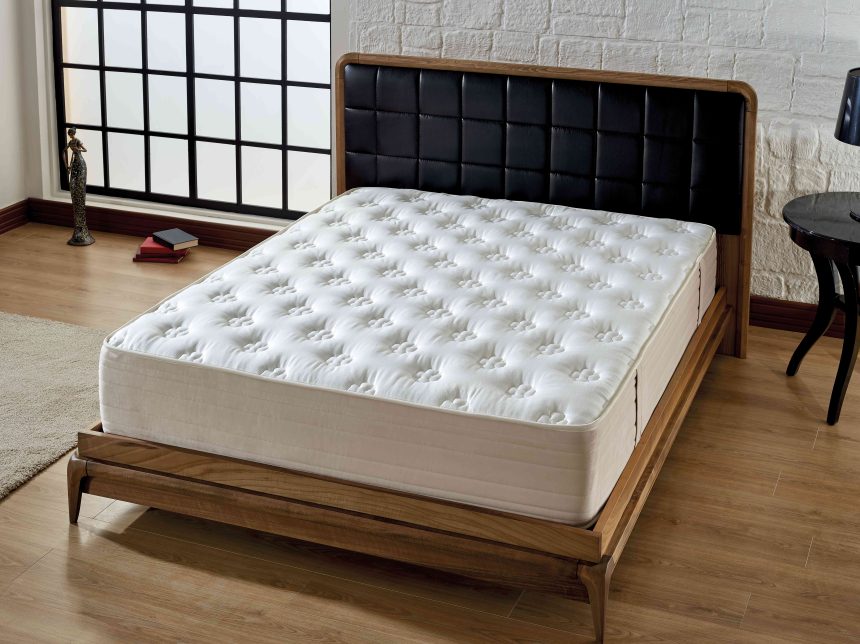There are plenty of things you can try to improve your sleep, from nightstand plants to bedroom design. But there’s no getting around it: Your mattress is one of the most important factors in the pursuit of a good night’s sleep. A worn-out one could affect the quality of your rest and, by extension, your health. So, how often should you change your mattress? You don’t want to swap it out too soon, but you also don’t want to wait until it’s a lumpy, uncomfortable mess.
Luckily, there are some telltale signs that’ll help you determine when it’s time to trade in your old mattress for a fresh model. Ahead, we spoke to an expert in all things mattresses to learn more.
Meet the Expert
Jakub Chmiel, mattress expert, manager and owner of various Philadelphia-area mattress stores over a 12-year period
You Haven’t Changed It In Years
The product’s age should be considered first when determining how often to change your mattress. “The general consensus is that a mattress should be replaced every seven to ten years,” says Jakub Chmiel, a mattress expert with over a decade of experience in the sleep business.
“But of course, this depends on factors like the quality of the mattress, how often it’s used, and the type of sleeper you are. A mattress could start to show wear sooner if cheaper materials are used or it’s not cared for properly.”
You’re Tossing and Turning All Night
Liudmila Chernetska / Getty Images
Do you find yourself waking up frequently throughout the night? “Struggling to get comfortable and tossing and turning throughout the night might mean a new mattress is needed,” says Chmiel. Consider mattress toppers and bedding upgrades to up the comfort level. Whenever you do decide to change out the mattress itself, be sure to test for firmness whenever possible.
There Is Visible Sagging and Indentations
Give your mattress a visual assessment. Does it sag in the middle? Are there visible indentations where you sleep? If so, this is a clear sign that your mattress has lost its shape and support. If rotating doesn’t improve the situation (it should be part of your regular mattress maintenance!) and you notice that the surface of your mattress feels uneven or that it’s sinking in certain areas, it’s time to start thinking about an upgrade.
You’re Feeling Stiff or Sore When You Wake Up
Pannonia / Getty Images
If your mattress is causing you to wake up with stiffness or pain—especially in your neck, back, or hips—it’s a major red flag. As your mattress ages, it can lose its ability to provide the right level of support for your body and put stress on pressure points, leading to discomfort and restless nights. If you’re consistently waking up feeling stiff, sore, or unrested, your mattress might be the culprit.
Consider your body’s specific needs: Those with certain health conditions or concerns, like chronic back pain or arthritis, may want to change their mattress more frequently.
The Mattress Just Feels Uncomfortable
A mattress should feel comfortable, plain and simple. Are you constantly adjusting your position? Adding extra layers of bedding? Whether due to previously storing it incorrectly, structural breakdown, or simply the mattress no longer matching your preferred sleep position, frequent discomfort may be a sign for change. (Be sure to check your warranty and return policy if you have a fairly new model.)
You Have Allergies or Respiratory Issues
Basak Gurbuz Derman / Getty Images
Mattresses can harbor dust mites and allergens if not properly cleaned and maintained. If you’ve had your mattress for several years and notice an increase in allergy symptoms, it could be due to irritants trapped in the fibers. Try a thorough deep clean—but think about replacing your mattress if symptoms aren’t alleviated and other triggers have been explored.
It’s Just Plain Time for a Change
If you’ve experienced a major life event, such as moving into a new home or undergoing a significant lifestyle shift, now might be the perfect time to get a new mattress that better suits your current needs. Whether it’s a switch from spring to memory foam or a desire for a larger bed, a mattress upgrade can feel like a fresh start.





